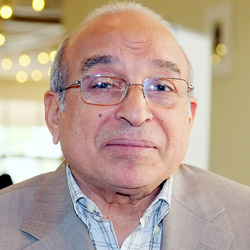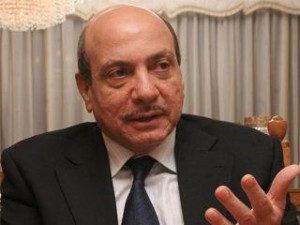One columnist claims that the whole of Sinai is the problem, and discusses how media and political forces failed, and the other discusses the Armed Forces’ role in the current crisis.
Fahmy Howeidy
It is Sinai that is abducted
Al-Shorouk Newspaper
Columnist Fahmy Howeidy, who is known for siding with the ruling party, addresses the issue of the kidnapped soldiers in his latest article. He begins by mentioning that the rate of violence in Sinai has increased since the revolution. “Winds of rebellion have always run through Sinai due to the security policies that have governed the country during the past decades,” he writes. “The same policies treated the people of Sinai as suspects.”
He explains that in the past, whenever a breach of security happened in Sinai, the people were always humiliated, citing the Sharm El-Sheikh bombings as an example. He credits his uncle; former defence minister and intelligence head Ameen Howeidy, for establishing connections with the heads of tribes in Sinai. Howeidy explains that his uncle blames the National Security Apparatus for ruining the relationship between the people of Sinai and the government, and that only the army treated them well. That is why the grip on Sinai has dwindled over the years.
He then goes through the list of incidents of the past two years in Sinai: 16 soldiers were murdered in Rafah; the Al-Zohour neighbourhood attack on peacekeepers; the Al-Awja security checkpoint attack that led to seven injuries; the attack on the Armed Forces cement factory; the attack on Al-Nakhl Police Station that led to a fatality and an injury; and finally the seven kidnapped soldiers.
He explains that there is a general lack of information regarding the social and geographical nature of Sinai. “I was told for example that there were 16 hotspots of Jihadist activity, but their sizes and locations were not accurately known.”
He blames political and media figures for linking Sinai with Gaza geographically, and alludes to people hinting at Hamas’ role in Sinai’s current state of affairs. He explains that “some official reports quickly blamed Hamas for any incident in Sinai”.
The columnist does not wish to separate between Sinai and Egypt’s current state. He blames others for daring to overstep their boundaries when addressing the ruling authority, and their disregard for law and order. “I do not rule out that this atmosphere was an encouraging factor to increase challenges of authority and the disregard of it.” He adds that the circumstances in Sinai do not differ from any other governorate, with the difference being that the kidnapped are soldiers instead of citizens.
He is surprised at those blaming President Mohamed Morsi for not taking action. He also mentions the different conspiracy theories that have surfaced as explanations for the kidnapping. He mentions that people considered it an attempt to humiliate the army or that it was an attempt to force the defence minister’s resignation. He also blames others for not bringing up the issue of “Sinai’s abduction and that it will not be solved until the state’s power is restored by revising the peace agreement with Israel”.
He adds that Egypt needs a more aware opposition and not one whose only concern is to topple the regime. He then warns against adopting a military solution to the crisis while ignoring a political one. He also warns against adopting oppression as the method for solving the problem.
Dr Ibrahim Al-Bahrawy
Yes to Al-Sisi, October’s army and democratic maturity
Al Masry Al Youm Newspaper
Columnist Dr Ibrahim Bahrawy begins his article by lamenting the vast difference between Israel’s military expansions and those of Egypt. “Our hostile neighbour who harbours expansive greed continuously upgrades its military ability,” Al Bahrawy exclaims. He also laments that the Egyptian authority and people do not seem to care about the huge gap between the two military powers.
Another aspect that he laments is that the Egyptian government and opposition seem to continuously try to make the Armed Forces side with one party over the other. “We do not see these attempts in societies with mature democratic traditions,” he explains, “where everyone preserves the army as a national force that is distanced from both government and opposition.”
He explains that this kind of practice ruins democracy, making the ruling party believe that it “owns the whole country, and it is free to act as it pleases as if [the country] is a family heirloom. In addition, this makes political opposition forces resort to chaos and violence.” He mentions that Taha Hussein explained this kind of state during the liberal monarchy period.
He expounds on why he fears including the military in issues of internal politics. Firstly, he believes that this will drain the Armed Forces. He notes that many Arab armies have collapsed after revolutions and civil wars. Secondly, he predicts that the military’s inclusion in politics will delay the development of the democratic process, and will hinder the progress of political parties.
“Therefore, I say ‘yes’ to Al-Sisi’s call on all political parties to find a mode of communication to be able to deal with each other, and to warn them ‘the army is like fire so don’t play with it’.” He then demands that the Muslim Brotherhood allow serious dialogue between the different political and social entities, and to reunite them all. He also demands the opposition stop trying to topple the president and try instead to reopen the dialogue concerned with Egypt’s rebuilding.
“I hope that both the rulers and opposition forces fear God in handling Egypt, and to seek calmly and wisely the building of correct and mature democracy, which will reserve the ruler’s right to issue policies and the opposition’s right to keep the dialogue going without makeshift barriers that confiscate ballot boxes,” Al-Bahrawy concludes.




